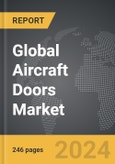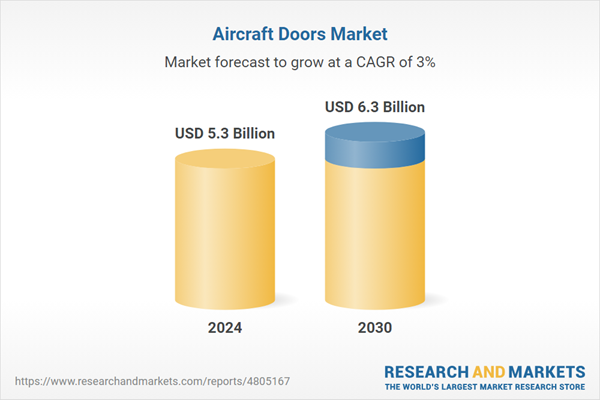Global Aircraft Doors Market - Key Trends and Drivers Summarized
What Makes Aircraft Doors Essential?
Aircraft doors are a crucial component of an aircraft's overall design, playing a pivotal role in ensuring the safety, security, and comfort of passengers and crew. They serve various functions, including providing access for boarding and deboarding, enabling emergency exits, and allowing for cargo and service operations. These doors are meticulously engineered to withstand extreme conditions such as high-altitude pressures, temperature variations, and aerodynamic forces. The design of aircraft doors must comply with rigorous aviation safety regulations, including being capable of rapid egress in emergencies. This aspect is critical, as the functionality and reliability of aircraft doors can be the difference between life and death in crisis situations. The integration of advanced materials and technologies has further enhanced the robustness and efficiency of these systems, making them a focal point in the design and manufacturing processes of modern aircraft.How Are Technological Innovations Shaping Aircraft Door Design?
The evolution of aircraft doors has been significantly influenced by technological advancements. One of the notable innovations is the use of composite materials, which offer a high strength-to-weight ratio, thereby improving fuel efficiency and overall aircraft performance. The shift towards lightweight materials like carbon fiber composites reduces the aircraft's weight, leading to lower fuel consumption and operational costs. Additionally, the implementation of advanced sealing technologies ensures better insulation and noise reduction, enhancing passenger comfort. Innovations in actuation mechanisms, such as electromechanical and hydraulic systems, have also streamlined door operations, making them more reliable and easier to maintain. These systems are equipped with sensors and automation features that monitor the door's status and functionality, ensuring they operate smoothly and safely under various conditions.Why Is Safety a Primary Concern in Aircraft Door Systems?
Safety is paramount in the design and operation of aircraft doors, with stringent standards governing their construction and functionality. Aircraft doors are equipped with complex locking and latching systems that prevent accidental opening during flight. They are designed to withstand high-pressure differentials, particularly during takeoff and landing phases, where the structural integrity of the aircraft is most tested. Emergency exits, a critical aspect of aircraft door systems, are designed for rapid evacuation, featuring intuitive handles and clear instructions to aid in quick and efficient use. These doors often incorporate inflatable slides for emergency evacuations, which must deploy rapidly and reliably in various environmental conditions. Regular maintenance and testing of aircraft doors are mandated to ensure compliance with safety regulations and operational readiness, highlighting the critical role these components play in aviation safety.What Drives the Growth in the Aircraft Door Market?
The growth in the aircraft door market is driven by several factors, including advancements in materials technology, increasing demand for fuel-efficient aircraft, and stringent safety regulations. The aviation industry's shift towards lightweight and durable composite materials has spurred innovation in door designs, reducing weight and enhancing performance. Additionally, the rise in global air travel demand, coupled with fleet modernization programs by airlines, has increased the need for new and more efficient aircraft, thereby driving demand for advanced door systems. Regulatory bodies' emphasis on safety and noise reduction has also pushed manufacturers to adopt cutting-edge technologies in door construction and operation, ensuring compliance with international standards. Moreover, the growing trend of customization in aircraft interiors has led to the development of bespoke door solutions tailored to specific airline requirements, further fueling market growth. The integration of smart technologies, such as IoT and real-time monitoring systems, provides additional value by enhancing operational efficiency and safety, making these advanced systems increasingly attractive to aircraft manufacturers and operators.Report Scope
The report analyzes the Aircraft Doors market, presented in terms of market value (USD). The analysis covers the key segments and geographic regions outlined below.- Segments: Door Type (Passenger, Cargo, Emergency, Landing Gear, Access, Other Door Types); Application (Commercial, Military); End-Use (OEM, Aftermarket).
- Geographic Regions/Countries: World; United States; Canada; Japan; China; Europe (France; Germany; Italy; United Kingdom; Spain; Russia; and Rest of Europe); Asia-Pacific (Australia; India; South Korea; and Rest of Asia-Pacific); Latin America (Argentina; Brazil; Mexico; and Rest of Latin America); Middle East (Iran; Israel; Saudi Arabia; United Arab Emirates; and Rest of Middle East); and Africa.
Key Insights:
- Market Growth: Understand the significant growth trajectory of the Commercial Aircraft Doors segment, which is expected to reach US$4.5 Billion by 2030 with a CAGR of 3.4%. The Military Aircraft Doors segment is also set to grow at 2.1% CAGR over the analysis period.
- Regional Analysis: Gain insights into the U.S. market, valued at $1.4 Billion in 2024, and China, forecasted to grow at an impressive 5.5% CAGR to reach $1.3 Billion by 2030. Discover growth trends in other key regions, including Japan, Canada, Germany, and the Asia-Pacific.
Why You Should Buy This Report:
- Detailed Market Analysis: Access a thorough analysis of the Global Aircraft Doors Market, covering all major geographic regions and market segments.
- Competitive Insights: Get an overview of the competitive landscape, including the market presence of major players across different geographies.
- Future Trends and Drivers: Understand the key trends and drivers shaping the future of the Global Aircraft Doors Market.
- Actionable Insights: Benefit from actionable insights that can help you identify new revenue opportunities and make strategic business decisions.
Key Questions Answered:
- How is the Global Aircraft Doors Market expected to evolve by 2030?
- What are the main drivers and restraints affecting the market?
- Which market segments will grow the most over the forecast period?
- How will market shares for different regions and segments change by 2030?
- Who are the leading players in the market, and what are their prospects?
Report Features:
- Comprehensive Market Data: Independent analysis of annual sales and market forecasts in US$ Million from 2024 to 2030.
- In-Depth Regional Analysis: Detailed insights into key markets, including the U.S., China, Japan, Canada, Europe, Asia-Pacific, Latin America, Middle East, and Africa.
- Company Profiles: Coverage of players such as Airbus Helicopters SAS, Barnes Group, Inc., Daher, Delastek, Inc., Elbit Systems Ltd. and more.
- Complimentary Updates: Receive free report updates for one year to keep you informed of the latest market developments.
Some of the 46 companies featured in this Aircraft Doors market report include:
- Airbus Helicopters SAS
- Barnes Group, Inc.
- Daher
- Delastek, Inc.
- Elbit Systems Ltd.
- Esterline Technologies Corporation
- Honeycomb Company of America, Inc.
- Latecoere SA
- Mitsubishi Heavy Industries, Ltd.
- SAAB AB
- Triumph Group, Inc.
This edition integrates the latest global trade and economic shifts into comprehensive market analysis. Key updates include:
- Tariff and Trade Impact: Insights into global tariff negotiations across 180+ countries, with analysis of supply chain turbulence, sourcing disruptions, and geographic realignment. Special focus on 2025 as a pivotal year for trade tensions, including updated perspectives on the Trump-era tariffs.
- Adjusted Forecasts and Analytics: Revised global and regional market forecasts through 2030, incorporating tariff effects, economic uncertainty, and structural changes in globalization. Includes historical analysis from 2015 to 2023.
- Strategic Market Dynamics: Evaluation of revised market prospects, regional outlooks, and key economic indicators such as population and urbanization trends.
- Innovation & Technology Trends: Latest developments in product and process innovation, emerging technologies, and key industry drivers shaping the competitive landscape.
- Competitive Intelligence: Updated global market share estimates for 2025, competitive positioning of major players (Strong/Active/Niche/Trivial), and refined focus on leading global brands and core players.
- Expert Insight & Commentary: Strategic analysis from economists, trade experts, and domain specialists to contextualize market shifts and identify emerging opportunities.
Table of Contents
Companies Mentioned (Partial List)
A selection of companies mentioned in this report includes, but is not limited to:
- Airbus Helicopters SAS
- Barnes Group, Inc.
- Daher
- Delastek, Inc.
- Elbit Systems Ltd.
- Esterline Technologies Corporation
- Honeycomb Company of America, Inc.
- Latecoere SA
- Mitsubishi Heavy Industries, Ltd.
- SAAB AB
- Triumph Group, Inc.
Table Information
| Report Attribute | Details |
|---|---|
| No. of Pages | 246 |
| Published | February 2026 |
| Forecast Period | 2024 - 2030 |
| Estimated Market Value ( USD | $ 5.3 Billion |
| Forecasted Market Value ( USD | $ 6.3 Billion |
| Compound Annual Growth Rate | 3.0% |
| Regions Covered | Global |









